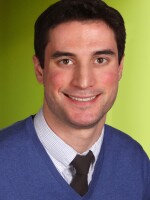It’s a Friday afternoon at the Technology Garden, a business incubator in Syracuse. The dozen-or-so staff members of software design company Rounded Development are sitting around on couches, chowing on Dinosaur Barbeque take-out and chatting up ideas for new products.
As one of the company’s co-founders, Eric Hinman, explains, the sessions are all about sparking creativity.
"That’s when ideas are born and that’s how large companies can be formed," Hinman says. "Around taking a step back [and] coming up with really cool ideas that solve real world problems."
One of Hinman's co-workers inquires whether anyone has an idea on how to conserve water while doing the dishes.

"Putting the stopper in (the drain)," someone replies as laughter breaks out. Problem solved.
They can't all be brilliant ideas.
These regular Friday get-togethers are not exclusive to Rounded employees. The company opens its doors to any entrepreneur who has an idea to pitch, or simply wants to hang out.
"We have a lot of ping-pong and four square mixed in there too," Hinman explains.
It’s all a mini-example of some of what makes a good startup community: inspiration, interaction and the leadership of more senior entrepreneurs.
"A huge, huge gap"
Rounded occupies one of the largest offices in the Tech Garden, which opened seven years ago in what was once a partially collapsed parking garage downtown. It took awhile for the space to fill up, says Mitchell Patterson, who helps run the incubator. But the Tech Garden has now become a major hub of startup activity in Syracuse and was just renovated to make more room.
Patterson says cheap rent is a big draw for young startups to Syracuse, but a lack of investment money is a major hurdle to them growing.
New%20York%20City%20has%20over%20%24900%20per%20person%20available%20in%20venture%20capital.%20Syracuse%20has%20%2417.
"New York (City) even, which is newer to the game, has over $900 per person when you break it down with how much venture capital’s available. Syracuse has $17," he says. "That is just a huge, huge gap that isn’t being filled."
That’s a sentiment often heard from smaller cities trying to build startup communities.
(Here's a ranking of the top 10 cities for venture capital.)
Critical mass
Brad Feld, a venture capitalist from Boulder, Colorado who’s written a book about startup communities, argues that if a community is building interesting companies, the investment dollars will come.
Feld says it takes at least a generation of entrepreneurs committed to not only building their business, but also building their community. If enough leaders, as he calls them, stick around then eventually the community will hit a critical mass of entrepreneurship.
"But if everybody wants to move out of the community, nothing is going to sustain over time," he says.
An important source of potential leaders and new talent to a startup community, according to Feld, is a strong university.
"If some percentage of those new, young smart people decide to stay and start a company in the city over time, again over this long period of time, the startup community will grow and develop," he says.
Entrepreneurship programs at Syracuse University are flourishing.
A recent study by the Kauffman Foundation, an organization working to boost entrepreneurship, found that the areas educating the most entrepreneurs were more likely to retain their companies.
Competing with the Holy Grail
But keeping young tech companies in smaller cities like Syracuse can still be challenge. The city must compete with a desire by 20-somethings to live in trendier places like New York City and the mindset that they need to be located their in order to make it big.
Once a poster child of the Syracuse startup scene, online reputation service BrandYourself recently moved most of its operations to New York City, drawn away by investors and a desire to grow. The company was started by a trio of Syracuse University students. Co-founder Patrick Ambron says Syracuse was a great place to start out.
"They have different advantages and disadvantages," Ambron says of New York City versus Syracuse. "And depending on which stages [you're in], you have to weigh which ones are more important to you as a company."
But he adds The Big Apple has things central New York just can't match.
%22There%27s%20a%20perception%20the%20Holy%20Grail%20sits%20in%20Silicon%20Valley.%20That%27s%20just%20not%20true.%22
"What New York City has that Syracuse couldn't complete on is direct access to media, direct access to business development partners, because there are a lot more bigger companies in New York City," Ambron says.
While the move may work out well for BrandYourself, Donna Harris of the Startup America Partnership, argues many companies suffer from the notion that the grass will be greener on the other side if they relocate.
"There’s a perception that the Holy Grail sits in Silicon Valley and if only you move, everything will be right with your company," she says. "And that’s just not true."
Harris says it only takes few companies to decided to stay put, and be successful, to start a trend and put a community on the proverbial map. And the team at Rounded seems to want to help start it.
"I would love to see Rounded as that company" that makes it big in Syracuse, Hinman says. He adds the company has no plans or pressures to move.
That's a start, but Syracuse still might need a few more companies before it earns startup community bragging rights.
You can follow reporter Ryan Delaney on Twitter @RyanWRVO







